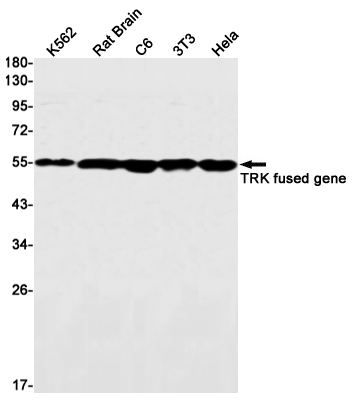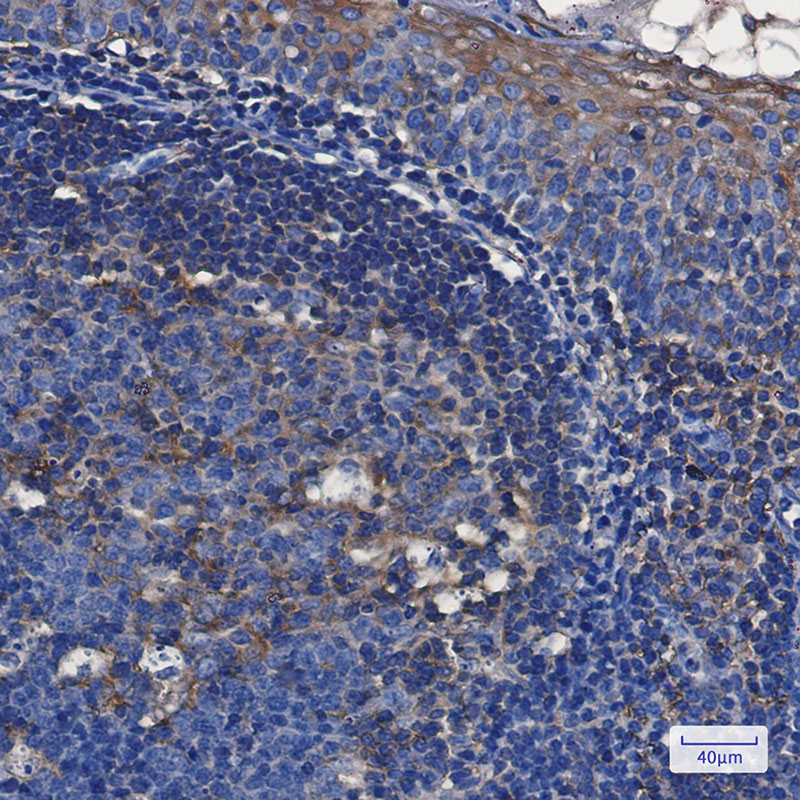

| WB | 1/500-1/1000 | Human,Mouse,Rat |
| IF | 1/20 | Human,Mouse,Rat |
| IHC | 1/50-1/100 | Human,Mouse,Rat |
| ICC | 技术咨询 | Human,Mouse,Rat |
| FCM | 咨询技术 | Human,Mouse,Rat |
| Elisa | 咨询技术 | Human,Mouse,Rat |
| Aliases | TF6; HMSNP; SPG57; TRKT3 |
| Entrez GeneID | 10342 |
| WB Predicted band size | Calculated MW: 43 kDa; Observed MW: 55 kDa |
| Host/Isotype | Rabbit IgG |
| Antibody Type | Primary antibody |
| Storage | Store at 4°C short term. Aliquot and store at -20°C long term. Avoid freeze/thaw cycles. |
| Species Reactivity | Human,Mouse,Rat |
| Immunogen | A synthetic peptide of human TRK fused gene |
| Formulation | Purified antibody in TBS with 0.05% sodium azide,0.05%BSA and 50% glycerol. |
+ +
以下是关于TFG抗体的3篇参考文献及其摘要概述:
---
1. **文献名称**:*TFG regulates secretory protein sorting and processing in the trans-Golgi network*
**作者**:Wagner, K., et al.
**摘要**:该研究揭示了TFG(TRK-fused gene)蛋白在跨高尔基体网络(TGN)中对分泌蛋白分选和加工的关键作用。通过抗体阻断实验,作者发现TFG缺失会导致特定分泌蛋白的异常运输,表明其在内分泌囊泡形成中的调控功能,为癌症及神经退行性疾病中TFG异常提供了机制解释。
---
2. **文献名称**:*TFG-ALK fusion gene and its protein product in inflammatory myofibroblastic tumors*
**作者**:Lee, J.C., et al.
**摘要**:本研究在炎性肌纤维母细胞瘤(IMT)中发现了新型TFG-ALK融合基因,并通过抗体验证了融合蛋白的表达。TFG与ALK的融合导致激酶活性持续激活,驱动肿瘤发生,提示针对TFG-ALK的抗体检测可作为此类肿瘤的诊断标志物及治疗靶点。
---
3. **文献名称**:*TFG mutations in hereditary motor neuropathy disrupt ER-associated degradation*
**作者**:Ito, D., et al.
**摘要**:文章报道了TFG基因突变导致遗传性运动神经病的机制。利用特异性抗体标记,发现突变型TFG蛋白无法介导错误折叠蛋白的内质网相关降解(ERAD),引发运动神经元内质网应激和轴突退化,为神经退行性疾病的治疗策略提供了新方向。
---
这些文献涵盖了TFG在分泌途径调控、肿瘤融合基因及神经疾病中的作用,抗体技术在其中用于蛋白定位、功能验证及病理机制解析。如需具体应用(如诊断或治疗),建议进一步筛选针对性研究。
TFG (TRK-fused gene) encodes a protein involved in intracellular vesicle trafficking and protein transport, primarily localized to the endoplasmic reticulum and Golgi apparatus. Initially identified in 1998 as a fusion partner with neurotrophic tyrosine receptor kinase (NTRK1/TRKA) in papillary thyroid carcinoma, TFG rearrangements have since been linked to diverse cancers, including spindle cell tumors and hematopoietic malignancies. The TFG protein contains coiled-coil domains that mediate oligomerization and interactions with components of the COPII vesicle coat complex, playing critical roles in endoplasmic reticulum export and secretory pathway organization.
TFG antibodies are essential tools for studying these biological processes and associated pathologies. In research, they help detect TFG expression levels, subcellular localization, and fusion protein products resulting from chromosomal translocations. Clinically, TFG antibodies aid in diagnosing TFG-rearranged cancers through immunohistochemistry or fluorescence in situ hybridization (FISH). Recent studies also explore TFG's potential roles in neurodegeneration, as its dysfunction may contribute to protein aggregation in conditions like amyotrophic lateral sclerosis (ALS). Commercial TFG antibodies are typically raised against specific epitopes in the N-terminal or coiled-coil regions, with validation across multiple applications remaining crucial due to variability in fusion partner contexts.
×